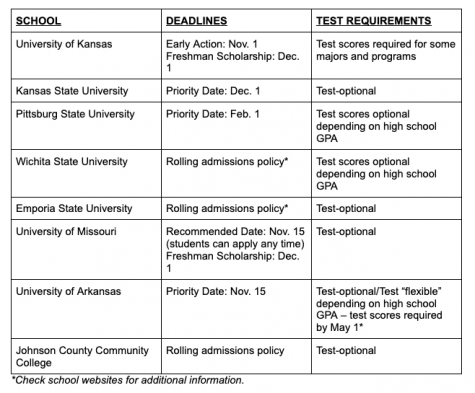Decisions, Decisions
A senior’s guide to navigating college applications
October 16, 2020
If you’re a senior and you still don’t know where you will end up next fall, the clock is ticking.
Instead of being stressed out over the process, seniors are encouraged to take advantage of the resources available to them. College adviser Mallory Martin is able to help seniors with any questions they have during school hours, and she also sends out monthly newsletters and content on social media platforms.
“Seniors are either reaching out to me via email with questions, or I’ve been using a text feature, so if students prefer texting, we can do that,” Martin said. “A handful have reached out to me requesting to do WebEx meetings. I’m able to do that as long as students complete the parent consent to do telecounseling.”
Students would usually have access to in-person informational events, such as meeting representatives from different colleges and learning how to fill out the Free Application for Federal Student Aid (FAFSA). Martin doesn’t know how that information will be presented this fall, but it will still be available. However, regardless of the way information is conveyed, there are still deadlines coming up that will not be changed because of COVID-19.
“Kansas schools have a scholarship deadline that will sneak up fast,” Martin said. “The scholarship deadline is for seniors who are hoping to qualify for automatic freshman scholarships, or merit-based scholarships. That means you qualify for scholarships from the school, based on your ACT score and GPA.”
Merit-based scholarship requirements can be found on college websites, but some of the most popular schools for NW graduates include KU, which gives $$20,000 ($5,000/yr) for a 32 ACT and a 3.85 GPA or $$4,000 ($1,000/yr) for a 25 ACT and a 3.5 GPA, K-State, which gives $14,000 ($3,500/yr) for a 28 ACT and 3.7 GPA and Pittsburgh State, which offers $500-$1,200 depending on ACT scores and GPA. Most colleges and universities have altered their admissions process in the wake of COVID-19. Students may not have to submit test scores to apply, and GPA requirements could be changed. Martin says it’s important to consider the limitations of skipping the ACT, even though it may seem like a good idea.
“The test-optional route sounds so good, and I’m glad the schools are starting to allow that,” Martin said. “But I think students don’t always understand that, if they want scholarship money, they still have to submit an ACT score.”
Once students have taken their admissions tests and are ready to apply, the next question is, where to? Some decide that community college is the best option for them, while others wish to attend a more selective university. Johnson County Community College (JCCC) recruiter Jean Cantero explains the benefits of going to a community college for the first two years of college in lieu of going to a traditional university all four years – JCCC does not require prospective students to have an ACT score on file, and tuition is less expensive than going to a state college.
“I went with the intention of saving money on my tuition,” Cantero said. “There was a chance to knock out all of my general education credits, and then transfer to a university where I then finished up my bachelor’s degree. I was able to graduate with my bachelor’s degree without any student debt.”
Along with saving money, Cantero didn’t have to worry as much about what he was going to study while attending community college.
“JCCC can really lead you to a lot of different paths,” Canero said. “I wasn’t sure what I wanted to study in college quite yet. JCCC gave me that flexibility.”
Students who decide to go to a four-year university have several factors to consider. This includes choosing an appropriate distance from home, the size of the school, selectiveness of admissions and programs the school offers. 2020 NW graduate Annalissa Houser chose to attend the University of Arkansas because of its proximity to home, among other reasons.
“I had a lot of very, very different schools in mind, on all ends of the country,” Houser said. “None of them really had anything in common. There were programs I liked. I like the honors college here, and all of the opportunities .”
On the other hand, 2020 NW graduate and current Stanford University freshman Alyssa Murray chose to move to the West Coast to pursue a competitive program.
“Most of the universities I applied to were either on the East Coast or the West Coast, because I wanted to get out of the Midwest,” Murray said. “I’m going into international relations – my last decision was between Stanford and Princeton, and Stanford seemed like the better school for global health policy.”
If seniors have questions or concerns about anything college-related, they can reach out to Martin via email (mallorymartin@smsd.org), or they can find college-specific recruiters on university websites.










